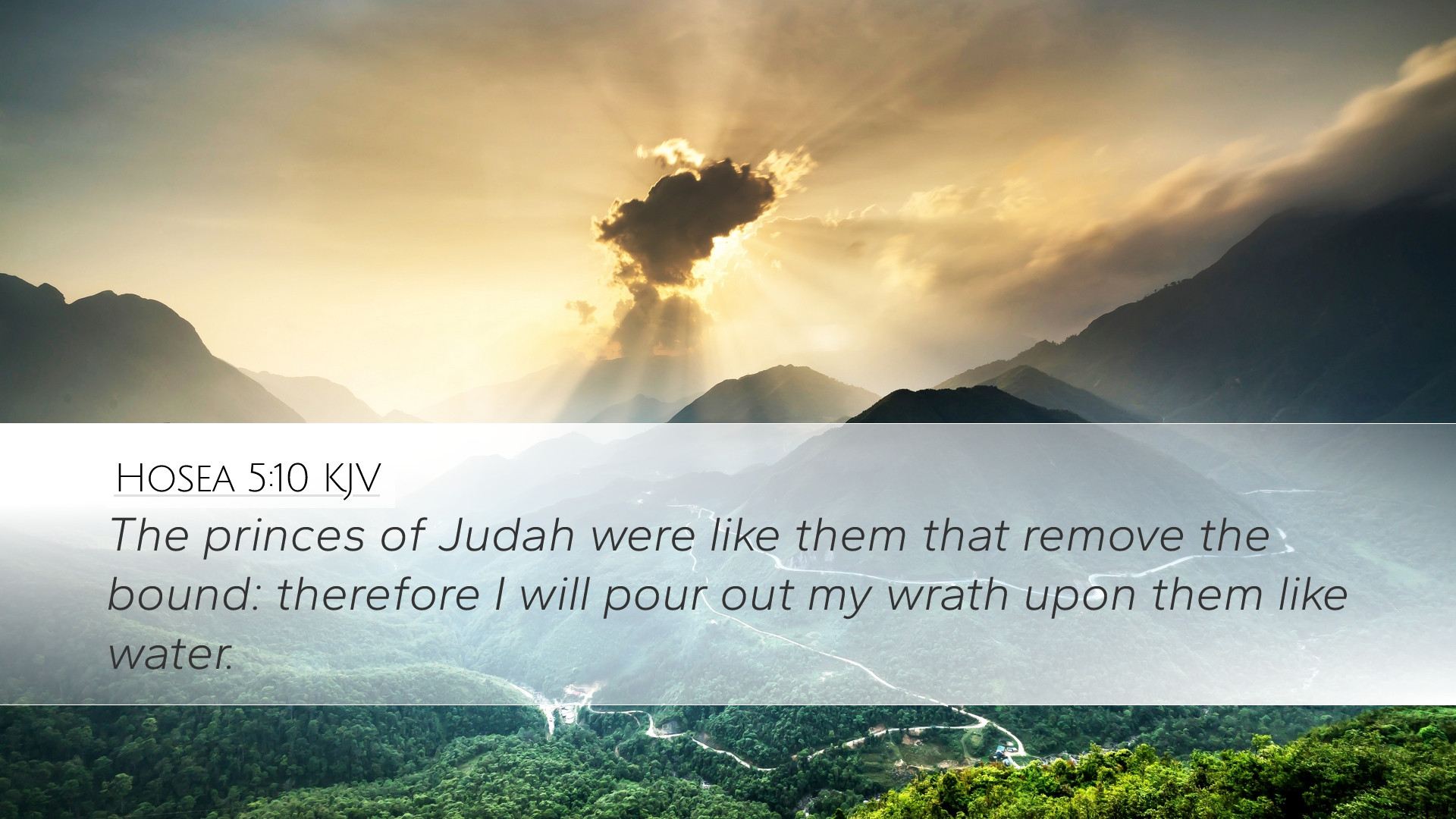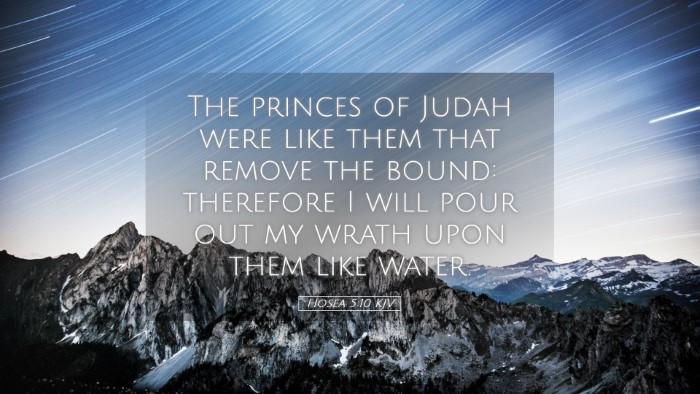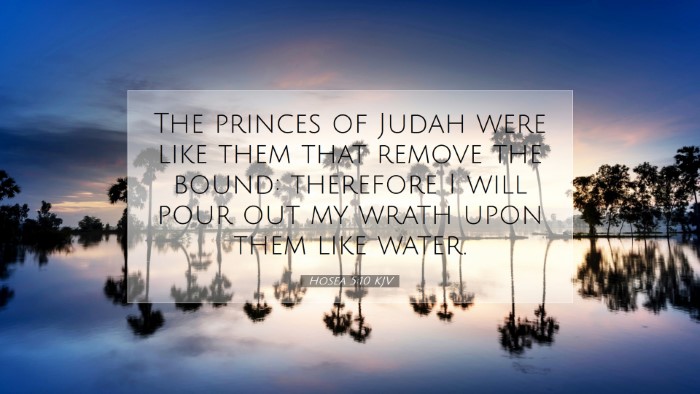Old Testament
Genesis Exodus Leviticus Numbers Deuteronomy Joshua Judges Ruth 1 Samuel 2 Samuel 1 Kings 2 Kings 1 Chronicles 2 Chronicles Ezra Nehemiah Esther Job Psalms Proverbs Ecclesiastes Song of Solomon Isaiah Jeremiah Lamentations Ezekiel Daniel Hosea Joel Amos Obadiah Jonah Micah Nahum Habakkuk Zephaniah Haggai Zechariah MalachiHosea 5:10
Hosea 5:10 KJV
The princes of Judah were like them that remove the bound: therefore I will pour out my wrath upon them like water.
Hosea 5:10 Bible Commentary
Commentary on Hosea 5:10
Hosea 5:10 (KJV): "The princes of Judah were like them that remove the bound: therefore I will pour out my wrath upon them like water."
Contextual Overview
The Book of Hosea addresses the spiritual and moral decay of the Northern Kingdom of Israel during the time of the divided monarchy. Hosea, a prophet, uses personal and national metaphors to convey God’s message of judgment and restoration. In chapter 5, God’s accusations against Israel and Judah reach a climax, highlighting the corrupt leadership and idolatrous practices that have led the nation astray.
Analysis of Hosea 5:10
In this verse, God likens the leaders of Judah to those who "remove the bound," suggesting that they are disregarding the laws and boundaries set by God for His people. This reflects a broader theme in Hosea of leadership failing to uphold divine standards.
Historical Context
Understanding the historical context of Hosea is crucial. The mention of "princes of Judah" indicates that both the Northern and Southern kingdoms are in view. During this period, Judah's leadership was influenced by Israel's idolatrous practices. Hosea’s pronouncements serve as both judgment on Israel and a warning to Judah about the consequences of such behavior.
Spiritual Implications
Matthew Henry emphasizes that the "princes of Judah" represent those in authority who should lead by example. Their failure to adhere to God’s laws invites divine wrath. This statement serves as a solemn reminder for leaders today, that their actions can either cement or erode the moral foundation of their communities.
The Metaphor of Boundaries
In ancient Israel, boundaries were sacred, representing property, rights, and divine commandments. Albert Barnes elaborates on this metaphor, stating that the removal of boundaries signifies a disregard for divine law, leading to chaos and moral decline. The idea is both literal and metaphorical: as physical boundaries are displaced, so too are spiritual guidelines.
Divine Wrath
God's promise to "pour out my wrath upon them like water" is a vivid illustration of the impending judgment. Adam Clarke notes that this phrase stresses the overwhelming and uncontrollable nature of God’s judgment when His people stray from His commands. The use of "water" implies a deluge—a comprehensive and thorough judgment.
Theological Reflections
Hosea 5:10 opens up profound theological discussions regarding divine justice and human responsibility. The princes' actions are not merely political or social; they are deeply spiritual, reflecting a covenant relationship between God and His people.
Leadership in the Church
For modern pastors and leaders, this verse serves as a powerful reminder of the importance of integrity and adherence to God's Word. Church leaders must recognize their role as shepherds who guide their congregations according to divine principles. Henry encourages leaders to remember that deviation from God’s will results in detrimental consequences not only for themselves but also for those they lead.
The Role of Prophecy
In the broader narrative of Hosea, we see the essential role of the prophet in calling out sin and reminding the people of their covenant obligations. This prophetic voice remains crucial for today’s church, as it calls for repentance and a return to the truth of Scripture. Clarke notes that the prophetic ministry holds leaders accountable to uphold God's standards, ensuring that the community strives for holiness.
Practical Applications
The implications of Hosea 5:10 extend beyond its historical context into contemporary Christian life.
- Accountability: Leaders must hold each other accountable to Scripture and their community.
- Integrity: Personal integrity is paramount for anyone in positions of influence.
- Restoration: Recognizing the redemptive nature of God’s judgment encourages believers to pursue restoration even after failure.
Call to Action
The message of Hosea invites ongoing self-examination and a communal response to sin. As the church contemplates the implications of forsaking God's boundaries, there is an urgent call to return to the Source of all truth and righteousness. Leaders are encouraged to foster environments where God’s commands are cherished, and spiritual growth flourishes.
Conclusion
Hosea 5:10 serves as a rich text for understanding the intersection of leadership, morality, and divine judgment. Through the insights of Matthew Henry, Albert Barnes, and Adam Clarke, we glean a wealth of knowledge that applies to both ancient Israel and the modern church. This verse stands as a warning and a call to fidelity, urging all leaders and believers to faithfully adhere to the boundaries established by God.


